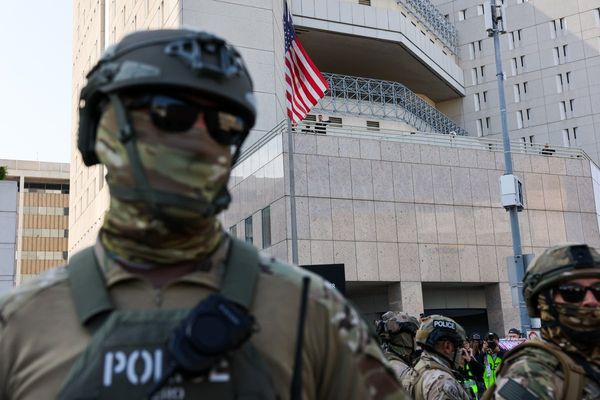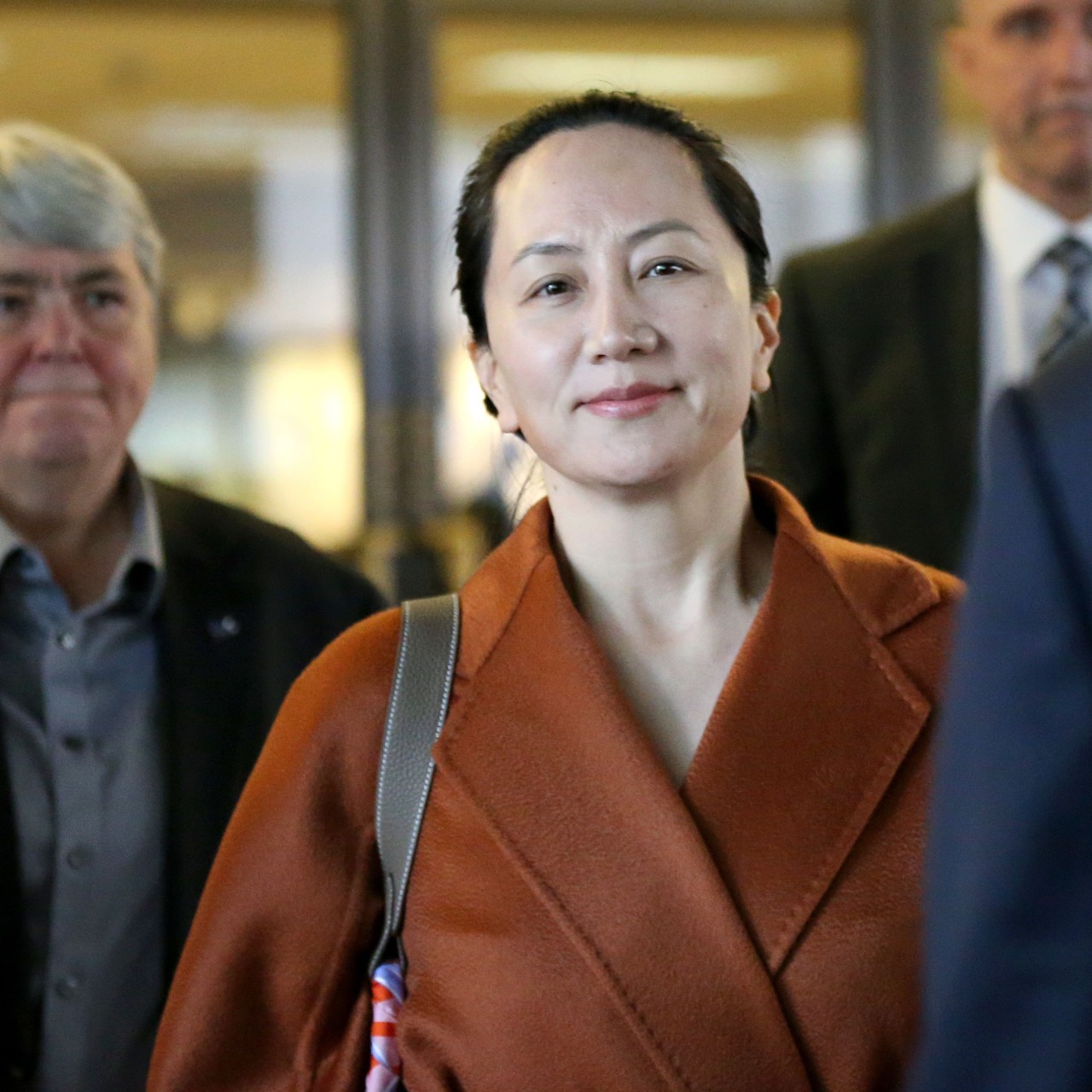
Sabrina Meng Wanzhou said she was thankful for the support she had received, following the opening day of a Vancouver court hearing in which her lawyers are attempting to fend off a US request for her extradition.
The Huawei chief financial officer posted a message on her social media account on Tuesday, saying she was “thankful to the support during the rain and storm, which is the sunshine shining into my heart”, the Global Times newspaper reported.
Lawyers for Meng on Monday accused Canadian border officers of conducting a “covert criminal investigation” into her, as they focused on documents relating to Meng’s arrest at Vancouver’s airport on December 1, on a stopover from Hong Kong on her way to Mexico.
The hearing, in the British Columbia Supreme Court before Justice Heather Holmes, is due to last eight days.
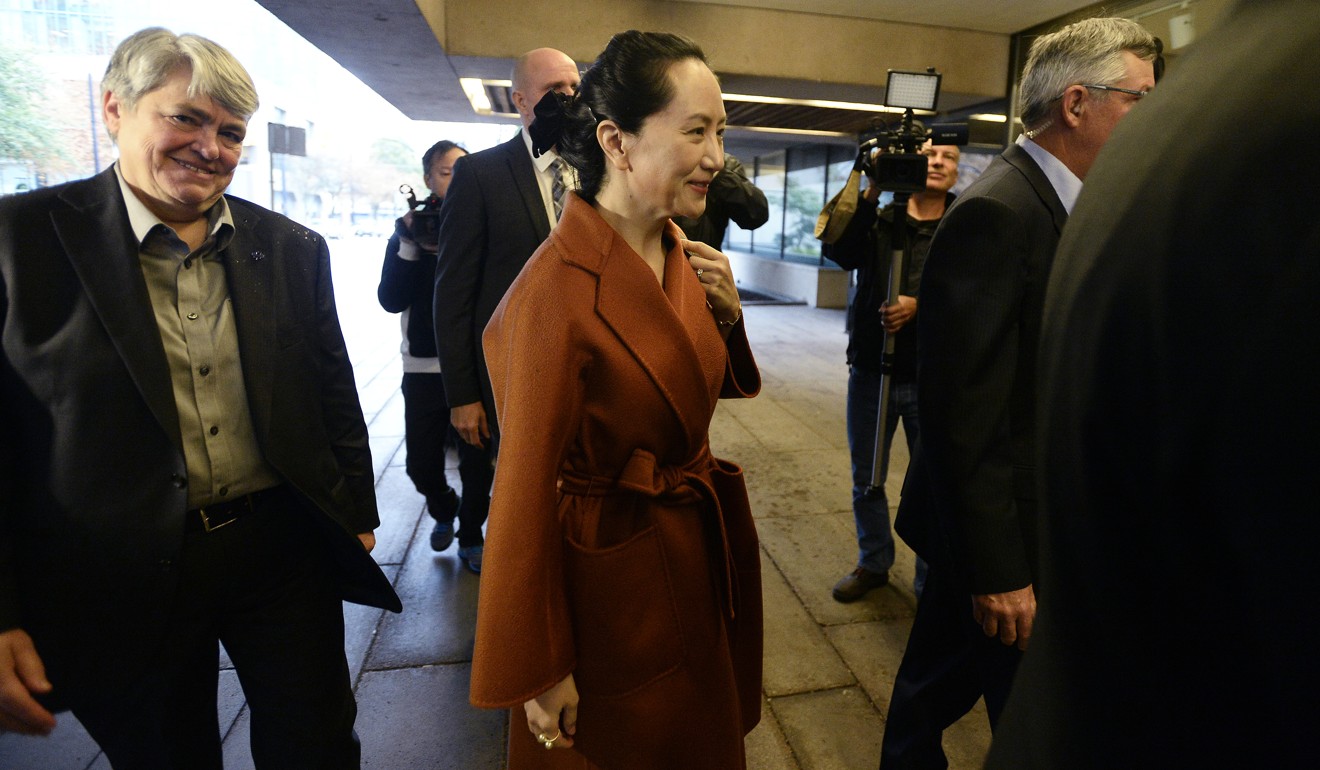
Meng’s legal team spent most of the hearing pursuing the disclosure of further documents they believe may exist relating to her arrest; the crown’s lawyers said that the requests amounted to a “fishing expedition” and that it has already satisfied document disclosure requirements.
Lawyer Richard Peck, acting for Meng, accused Canadian border officers of having “made efforts to obscure” interactions between the Canada Border Services Agency (CBSA) and the US Federal Bureau of Investigation that showed they were gathering evidence for Meng’s prosecution, and not simply conducting an admissibility exam for immigration purposes.
“The facts establish that the CBSA and [Royal Canadian Mounted Police] collaborated and arranged a plan to deal with Ms Meng in a way that violated … the provisional arrest warrant,” Peck said.
This plan gave the CBSA “an opportunity to interrogate” Meng, on behalf of the RCMP and the FBI, Peck said.
US authorities “traditionally abused and misused” immigration exams to gather evidence in criminal cases and had done so with Meng, Peck said.
He said that the FBI and US law enforcement “made it a priority to seize Ms Meng’s electronic devices” and that Canadian authorities had accepted this without question.
Peck cited emails involving an RCMP officer, “someone at the CBSA” and people with FBI-related email addresses before Meng’s arrest. He said the emails, sent around 5pm on November 30 – the day before the arrest – provided the FBI with contact details for a CBSA officer handling Meng’s case.
This helped demonstrate an abuse of the CBSA’s search powers, which were supposedly being exercised for immigration purposes, he said.
In a written submission to the court, dated September 17 and released on Monday, Canadian government lawyers arguing on behalf of the US said: “There is no evidence the RCMP played any role during [Meng’s] immigration process, or provided questions to the CBSA to ask of [Meng].”
Peck said CBSA officers wrote their notes in a way designed to deliberately “obscure” their knowledge about Meng's impending arrest, despite having met with RCMP officers about her case on the morning she arrived in Vancouver. “None of these officers’ notes … refer to this 9.30am meeting that occurred in their [CBSA] premises,” he said.
He cited two CBSA officers’ notes that included entries at the 6am start of their shift, but then nothing until after 11am, noting the arrival of Meng’s Cathay Pacific flight from Hong Kong. There was no mention of the officers’ meeting with the RCMP, Peck said. “Where was the 9.30am meeting? Not a peep,” said Peck.
He said sarcastically of the notes: “It looks like happenstance that they came across Ms Meng.”
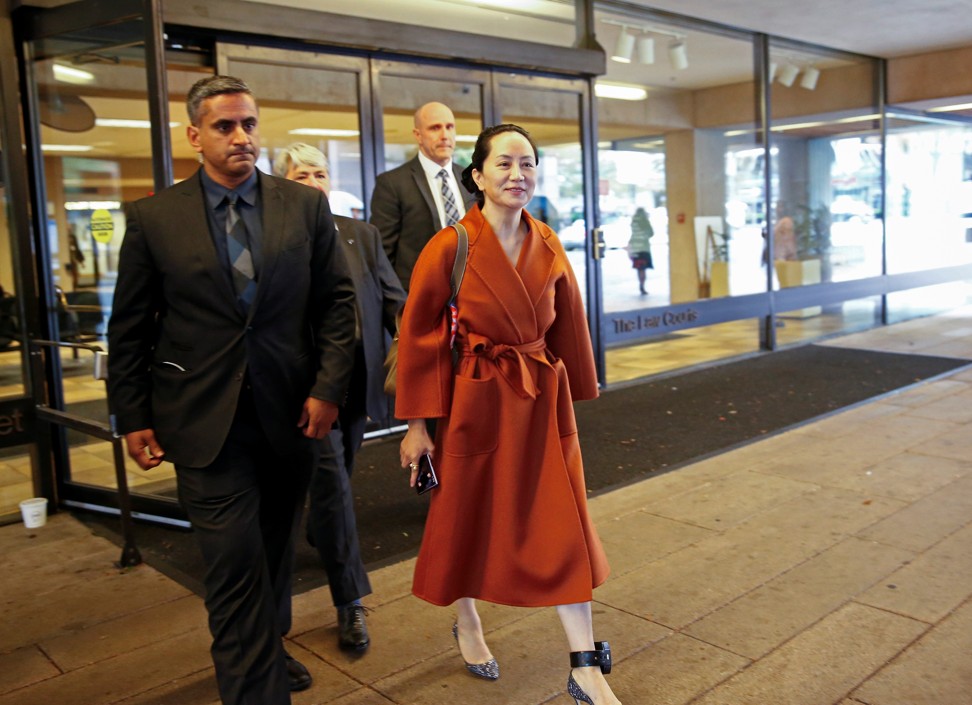
Video screens set up in the courtroom showed Meng with CBSA officers at Vancouver’s airport on December 1, before her arrest. Peck said that interaction between the officers seen in the silent CCTV video coincided with notes in an RCMP officer’s notes, and “demonstrates coordination and an unfolding plan between the CBSA and RCMP”.
The hearing began with lawyer John Gibb-Carsley, representing the crown on behalf of the US, saying he agreed with Meng’s lawyers that electronic copies of evidence should be distributed to reporters, given the intense interest in the case. Holmes agreed.
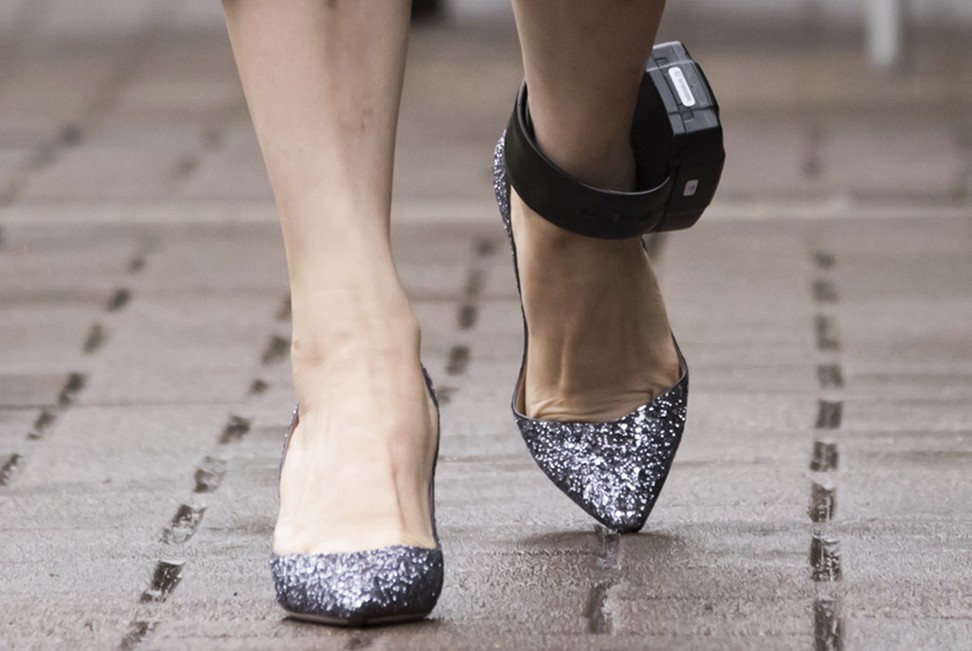
Holmes also agreed to a request from Meng’s lawyer David Martin that she and her translator be allowed to leave the dock and sit with her lawyers. This was to speed up proceedings by allowing her to see the binders of legal material lined up on the lawyers’ desks, during what Martin said would be a “document heavy” proceeding.
But Holmes denied a request by Gibb-Carsely to allow real-time transcription of proceedings to allow government lawyers outside the courtroom to follow the case, although she said she might revisit the matter.
Her lawyers have argued that her case fails to meet the Canadian extradition standard of dual criminality, which means that the charges must represent a crime in Canada as well as the requesting country.
Meng, flanked by two private bodyguards, greeted members of the public gallery queued up outside with reporters. Approached outside court, Meng declined to comment about her case. “But thank you for coming,” she added.
She arrived carrying a C$10,700 (US$8,064) Hermès Lindy handbag, wearing a long brown wool coat, a purple dress and a pair of three-inch Jimmy Choo heels below her ankle GPS monitor. She browsed on her Huawei phone in the dock as she waited for the proceedings to start.
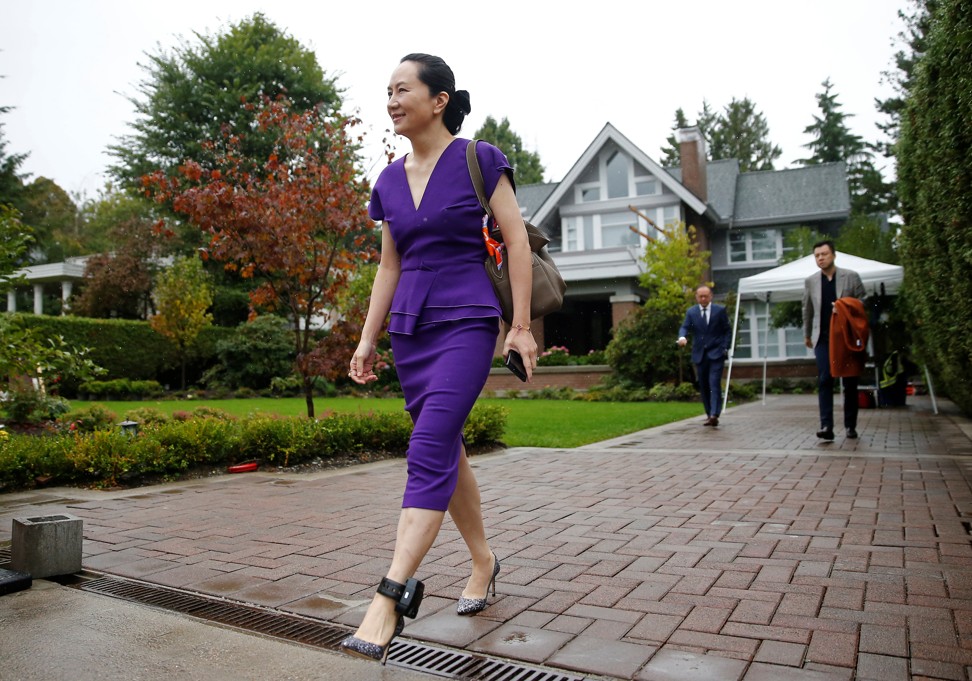
After the hearing, an apparent member of Meng’s entourage grabbed the South China Morning Post’s reporter by the arm and tried to pull him away from her as they left the courtroom. One of Meng’s bodyguards intervened and waved the man away from the reporter.
“I can’t talk to you,” said Meng, after being asked about the day’s proceedings.
Meng is wanted by the US to face trial for allegedly defrauding HSBC bank, related to alleged efforts by Huawei to dodge US sanctions by doing business in Iran.
Meng, 47, is the daughter of Huawei founder Ren Zhengfei.
Her arrest escalated tensions between China and the US amid the continuing trade war.
The case also sent China-Canada relations plunging to their worst point in years. After Meng’s arrest, China detained two Canadians, Michael Spavor and Michael Kovrig, accusing them of espionage; Canada says the detentions are retribution for the Meng case.
Meng has been released on C$10 million bail, and is living in a C$13 million home in Vancouver’s exclusive Shaughnessy neighbourhood a few doors down from the residence of the US consul-general.
It is one of at least two homes that Meng, a former Canadian immigrant, owns in Vancouver with husband Carlos Liu Xiaozong.
During a morning break, Meng chatted with Liu and China’s deputy consul-general in Vancouver, Wang Chengjun, showing Wang something on her phone.
The formal stage of the extradition hearing is expected to begin in January and last until around November 2020.
The hearing was adjourned until Tuesday morning.
Additional reporting by staff reporter




